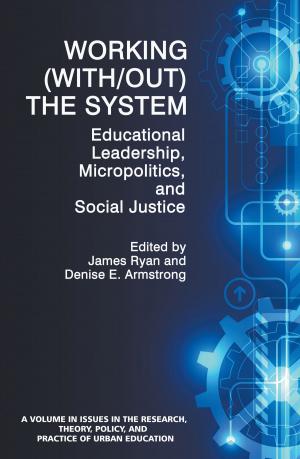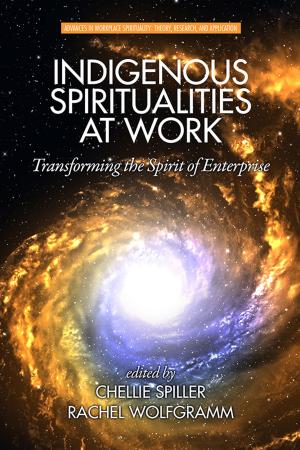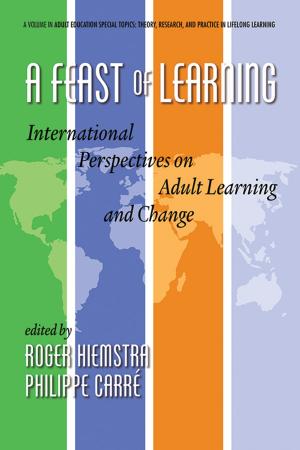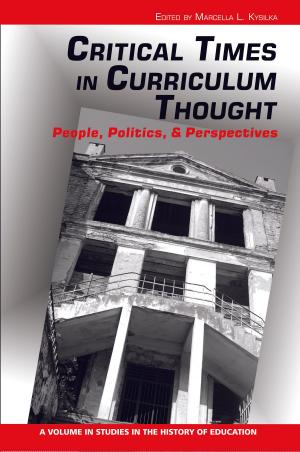Spirituality, Religion, and Peace Education
Nonfiction, Reference & Language, Education & Teaching, Religion & Spirituality| Author: | ISBN: | 9781617350603 | |
| Publisher: | Information Age Publishing | Publication: | July 1, 2010 |
| Imprint: | Information Age Publishing | Language: | English |
| Author: | |
| ISBN: | 9781617350603 |
| Publisher: | Information Age Publishing |
| Publication: | July 1, 2010 |
| Imprint: | Information Age Publishing |
| Language: | English |
Spirituality, Religion, and Peace Education attempts to deeply explore the universal and particular dimensions of education for inner and communal peace. This coedited book contains fifteen chapters on world spiritual traditions, religions, and their connections and relevance to peacebuilding and peacemaking. This book examines the teachings and practices of Confucius, of Judaism, Islamic Sufism, Christianity, Quakerism, Hinduism, Tibetan Buddhism, and of Indigenous spirituality. Secondly, it explores teaching and learning processes rooted in self discovery, skill development, and contemplative practices for peace. Topics in various chapters include: the Buddhist practice of tonglen; an indigenous Hawaiian practice of Ho’oponopono for forgiveness and conflict resolution; pilgrimage and labyrinth walking for right action; Twelve Step Programs for peace; teaching from a religious/spiritual perspective; narrative inquiry, Daoism, and peace curriculum; Gandhi, deep ecology, and multicultural peace education in teacher education; peacemaking and spirituality in undergraduate courses; and wisdombased learning in teacher education. Peace education practices stemming from wisdom traditions can promote stillness as well as enliven, awaken, and urge reconciliation, connection, wisdom cultivation, and transformation and change in both teachers and students in diverse educational contexts. In various chapters of this book, a critique of competition, consumerism, and materialism undergird the analysis. More than just a critique, some chapters provide both conceptual and practical clarity for deeper engagement in peaceful action and change in society. Cultural awareness and understanding are fostered through a focus on the positive aspects of wisdom traditions rather than the negative aspects and historical complexities of violence and conflict as result of religious hegemony.
Spirituality, Religion, and Peace Education attempts to deeply explore the universal and particular dimensions of education for inner and communal peace. This coedited book contains fifteen chapters on world spiritual traditions, religions, and their connections and relevance to peacebuilding and peacemaking. This book examines the teachings and practices of Confucius, of Judaism, Islamic Sufism, Christianity, Quakerism, Hinduism, Tibetan Buddhism, and of Indigenous spirituality. Secondly, it explores teaching and learning processes rooted in self discovery, skill development, and contemplative practices for peace. Topics in various chapters include: the Buddhist practice of tonglen; an indigenous Hawaiian practice of Ho’oponopono for forgiveness and conflict resolution; pilgrimage and labyrinth walking for right action; Twelve Step Programs for peace; teaching from a religious/spiritual perspective; narrative inquiry, Daoism, and peace curriculum; Gandhi, deep ecology, and multicultural peace education in teacher education; peacemaking and spirituality in undergraduate courses; and wisdombased learning in teacher education. Peace education practices stemming from wisdom traditions can promote stillness as well as enliven, awaken, and urge reconciliation, connection, wisdom cultivation, and transformation and change in both teachers and students in diverse educational contexts. In various chapters of this book, a critique of competition, consumerism, and materialism undergird the analysis. More than just a critique, some chapters provide both conceptual and practical clarity for deeper engagement in peaceful action and change in society. Cultural awareness and understanding are fostered through a focus on the positive aspects of wisdom traditions rather than the negative aspects and historical complexities of violence and conflict as result of religious hegemony.















